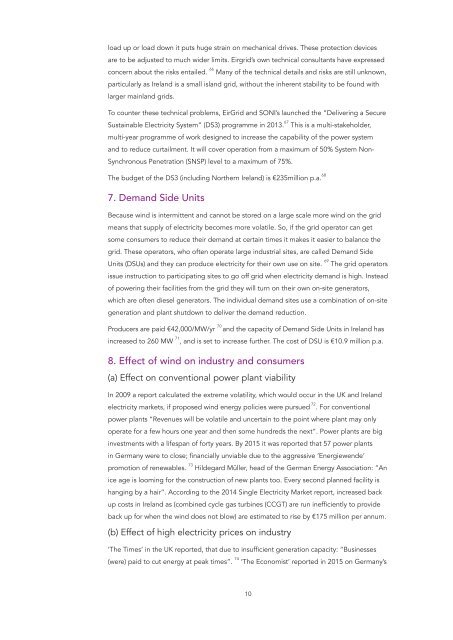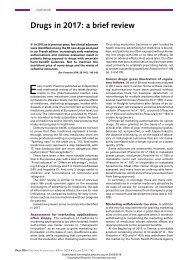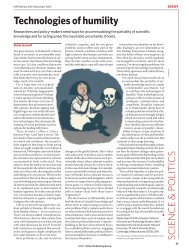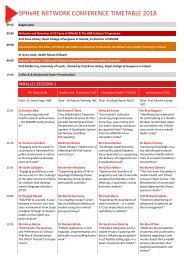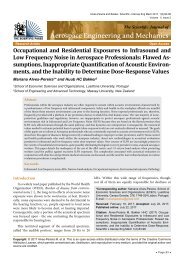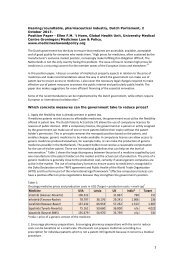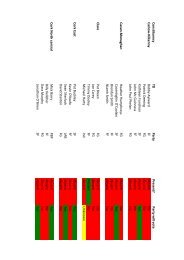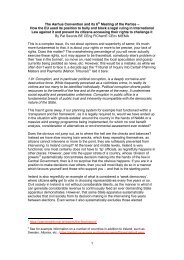Costs of Wind Energy Report
Create successful ePaper yourself
Turn your PDF publications into a flip-book with our unique Google optimized e-Paper software.
load up or load down it puts huge strain on mechanical drives. These protection devices<br />
are to be adjusted to much wider limits. Eirgrid’s own technical consultants have expressed<br />
concern about the risks entailed. 66 Many <strong>of</strong> the technical details and risks are still unknown,<br />
particularly as Ireland is a small island grid, without the inherent stability to be found with<br />
larger mainland grids.<br />
To counter these technical problems, EirGrid and SONI’s launched the “Delivering a Secure<br />
Sustainable Electricity System” (DS3) programme in 2013. 67 This is a multi-stakeholder,<br />
multi-year programme <strong>of</strong> work designed to increase the capability <strong>of</strong> the power system<br />
and to reduce curtailment. It will cover operation from a maximum <strong>of</strong> 50% System Non-<br />
Synchronous Penetration (SNSP) level to a maximum <strong>of</strong> 75%.<br />
The budget <strong>of</strong> the DS3 (including Northern Ireland) is €235million p.a. 68<br />
7. Demand Side Units<br />
Because wind is intermittent and cannot be stored on a large scale more wind on the grid<br />
means that supply <strong>of</strong> electricity becomes more volatile. So, if the grid operator can get<br />
some consumers to reduce their demand at certain times it makes it easier to balance the<br />
grid. These operators, who <strong>of</strong>ten operate large industrial sites, are called Demand Side<br />
Units (DSUs) and they can produce electricity for their own use on site. 69 The grid operators<br />
issue instruction to participating sites to go <strong>of</strong>f grid when electricity demand is high. Instead<br />
<strong>of</strong> powering their facilities from the grid they will turn on their own on-site generators,<br />
which are <strong>of</strong>ten diesel generators. The individual demand sites use a combination <strong>of</strong> on-site<br />
generation and plant shutdown to deliver the demand reduction.<br />
Producers are paid €42,000/MW/yr 70 and the capacity <strong>of</strong> Demand Side Units in Ireland has<br />
increased to 260 MW 71 , and is set to increase further. The cost <strong>of</strong> DSU is €10.9 million p.a.<br />
8. Effect <strong>of</strong> wind on industry and consumers<br />
(a) Effect on conventional power plant viability<br />
In 2009 a report calculated the extreme volatility, which would occur in the UK and Ireland<br />
electricity markets, if proposed wind energy policies were pursued 72 . For conventional<br />
power plants “Revenues will be volatile and uncertain to the point where plant may only<br />
operate for a few hours one year and then some hundreds the next”. Power plants are big<br />
investments with a lifespan <strong>of</strong> forty years. By 2015 it was reported that 57 power plants<br />
in Germany were to close; financially unviable due to the aggressive ‘Energiewende’<br />
promotion <strong>of</strong> renewables. 73 Hildegard Müller, head <strong>of</strong> the German <strong>Energy</strong> Association: “An<br />
ice age is looming for the construction <strong>of</strong> new plants too. Every second planned facility is<br />
hanging by a hair”. According to the 2014 Single Electricity Market report, increased back<br />
up costs in Ireland as (combined cycle gas turbines (CCGT) are run inefficiently to provide<br />
back up for when the wind does not blow) are estimated to rise by €175 million per annum.<br />
(b) Effect <strong>of</strong> high electricity prices on industry<br />
‘The Times’ in the UK reported, that due to insufficient generation capacity: “Businesses<br />
(were) paid to cut energy at peak times”. 74 ‘The Economist’ reported in 2015 on Germany’s<br />
10


